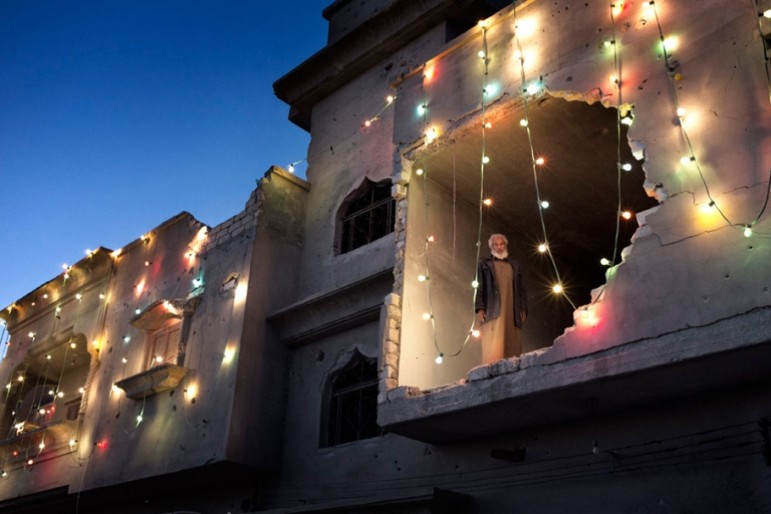Stories
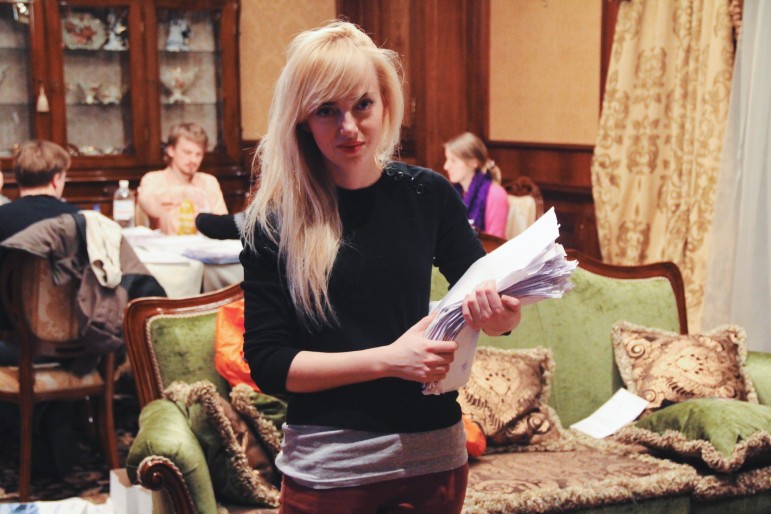
News & Analysis
“The Walls Have Fallen” – Inside YanukovychLeaks Investigation
This is a great time to be an investigative journalist in Ukraine. It is a moment of big disclosures. We had been reporting on the ultra-luxurious style of Yanukovych’s life and his corrupt ties for a long period, when this information was very well-guarded and kept as a big secret. It’s like one was trying to get into a closed, dark room for a long time. And then suddenly the walls have fallen.
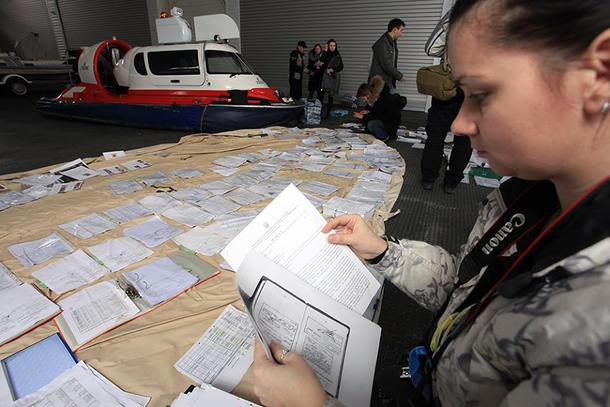
News & Analysis
YanukovychLeaks: How Ukraine Journalists Are Making History
In the hours after Ukraine President Viktor Yanukovych fled Kiev, reports started surfacing that there were documents floating in the reservoir on his palatial 350-acre estate outside the capital. The estate is well known to the media as an off-limits location; journalists, in fact, had never entered more than 300 yards past the front gate, and even at the height of Yanukovych’s openness and good relations, journalists had only been allowed to the front door to receive cakes on journalism day.
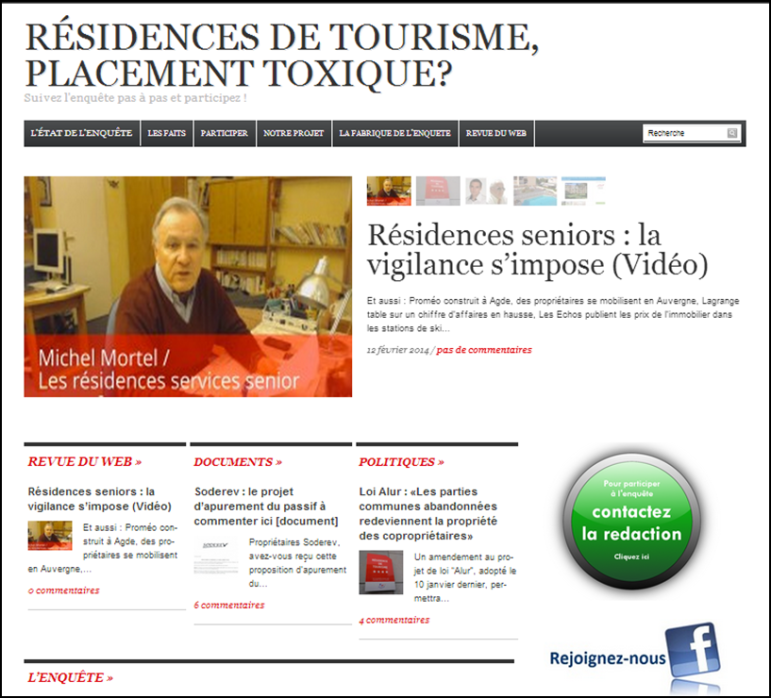
News & Analysis
Investigative “Stakeholder Media” Emerge in U.S., France
The Marshall Project’s recent launch announcement confirmed that in coming years, many new investigative news media will resemble stakeholder media — vehicles that are aimed at specific communities of interest. This non-profit Marshall Projectorganisation’s strategic goal is to become the central information hub for public insight into the criminal justice system. But within that general public, the first target will clearly be those directly concerned by the system. The stakeholder community for this venture is immense. It includes present and former prisoners, their families, law enforcement and auxiliaries, justice departments, the courts, lawyers — an audience of millions.

News & Analysis
New Global Consortium for Investigative Journ Educators
This week the Investigative Journalism Education Consortium begins a new initiative in bringing together journalism educators from throughout the world who teach investigative reporting. The idea to expand the range of IJEC emerged from the Global Investigative Journalism Conference held in October in Rio de Janeiro where the conference organized, for the first time, a professor track of sessions and presentation of papers. Professors from six continents found they had much in common and were eager to continue the conversations and share research and teaching methods.
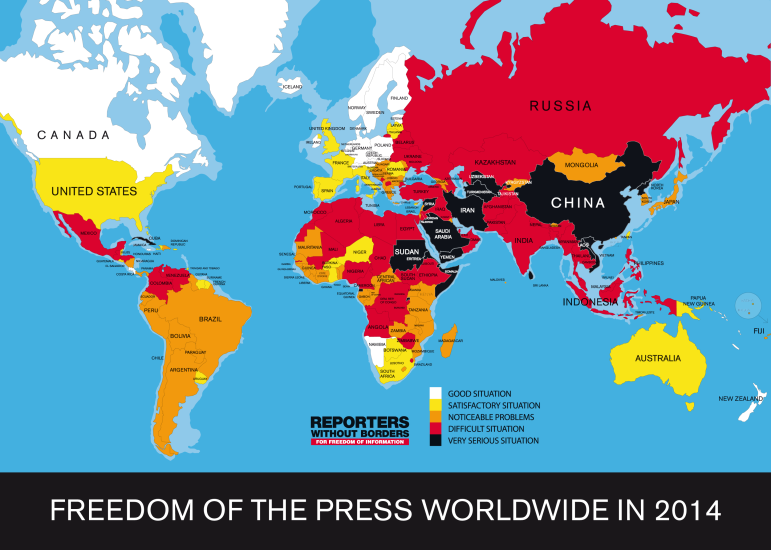
News & Analysis
Reporters Without Borders Releases Press Freedom Index
Reporters Without Borders today released its 2014 World Press Freedom Index, spotlighting major declines in media freedom in such varied countries as the United States, Central African Republic, and Guatemala while noting marked improvements in Ecuador, Bolivia, and South Africa. The same trio of Finland, Netherlands, and Norway heads the index again, while Turkmenistan, North Korea and Eritrea continue to be the biggest information black holes, again occupying the last three positions. You can find RSF’s full index and a 3-dimensional map here. The report is also available in several languages other than English.

News & Analysis
On the Trail: How To Request Information from Authorities
Power sets barriers and the reporter pushes back against them—it’s an unwritten rule on which Colombian writer Gabriel García Márquez believed all journalistic work is based. Some governments, however, have begun to voluntarily lower these barriers by approving legislation designed to make information more accessible to their citizens. To date, approximately 90 countries globally have freedom of information laws, which establish rules and deadlines for facilitating the collection of data.
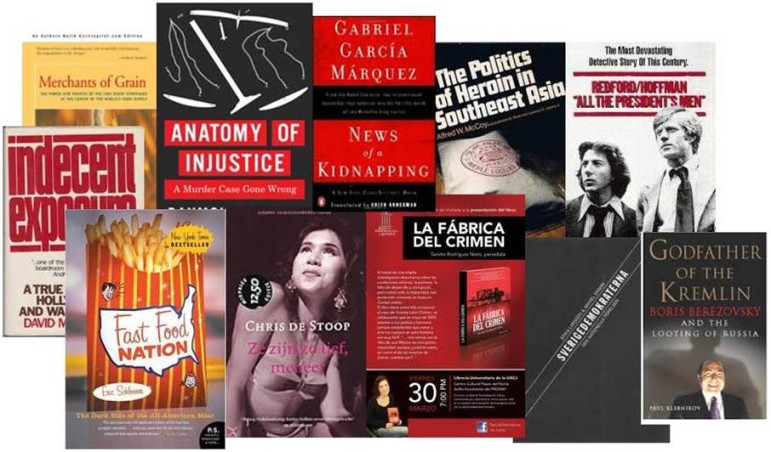
News & Analysis
Resources: A Guide to Investigative Books and Films
In June 2013, we invited our colleagues in the Global Investigative Journalism Network to name the book-length works of journalism, scholarship, and even fiction that had influenced their practice as investigators. The resultant list isn’t comprehensive – though we invite you to help complete it by sending us your favorites, including full title, authors, publication or broadcast date, a one-line bio to identify yourself so we can give you credit, and two or three lines that explain why you find a given work special. (Let someone else recommend your own stuff, please.)
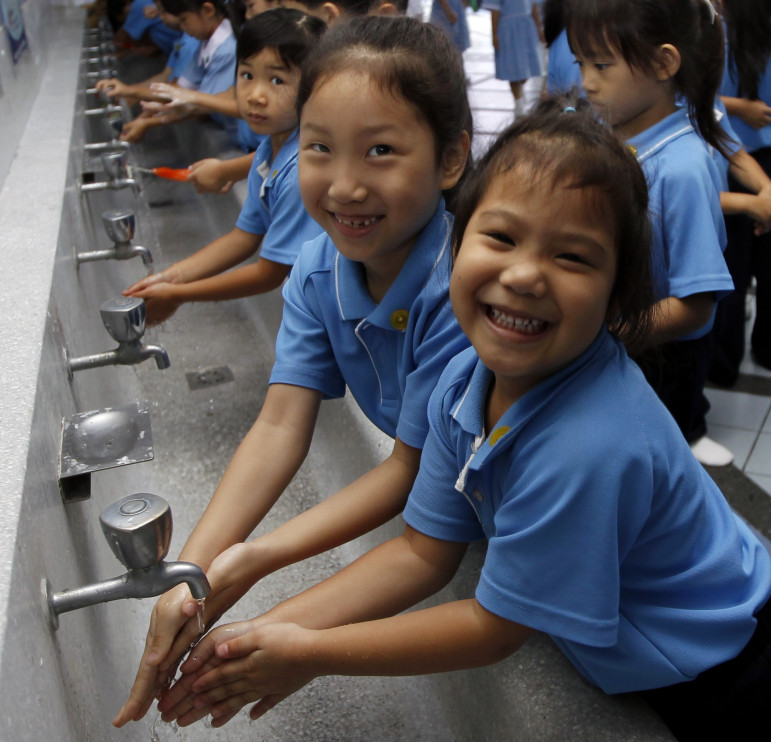
News & Analysis
A Dose of Advice: Tips on Covering Healthcare
In his 1999 book Development as Freedom, renowned economist and Noble laureate Amartya Sen stated that investment in healthcare can lead to success in meeting a wide range of development targets, such as those identified by the Millennium Development Goals (MDGs). Indeed, good healthcare improves quality of life, reduces morbidity and mortality, and raises economic productivity. As such, the World Health Organization (WHO) has recognised the importance of universal health coverage (UHC) and urged its member states to adopt programmes providing essential health packages.
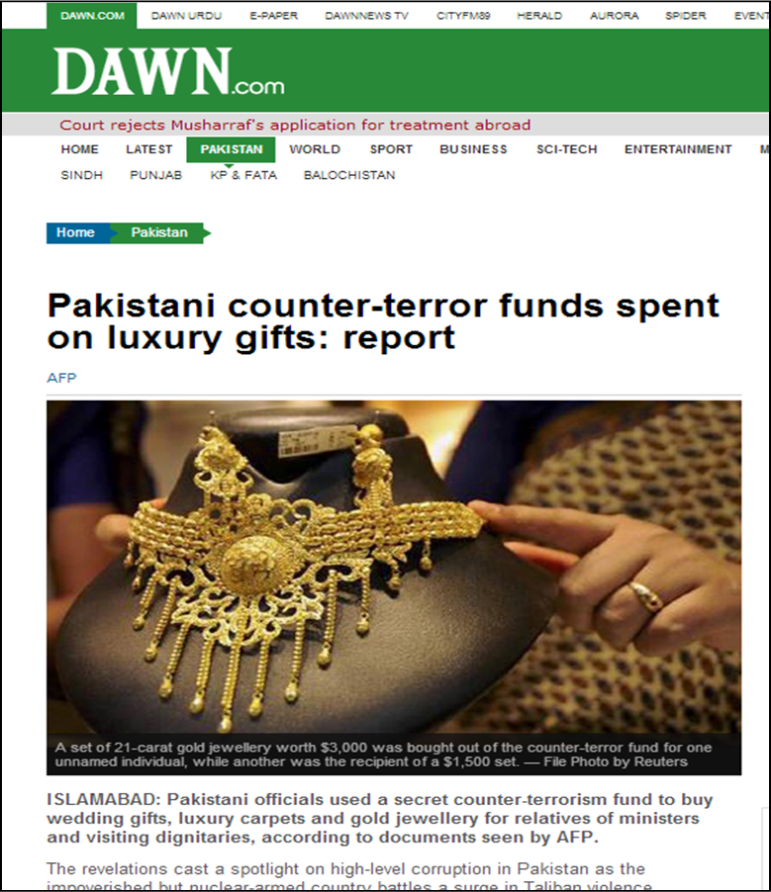
News & Analysis
“Don’t Talk of Hanging” – A Week of Investigative Reporting in Pakistan
How do you cover corruption in Pakistan’s national security agencies? With caution and plenty of guts. Such reporting got investigative journalist Umar Cheema kidnapped, tortured, and nearly killed in 2010, but the founder of the Center for Investigative Reporting in Pakistan hasn’t backed down. Check out the latest from the Islamabad-based Cheema, who this week revealed that elite counter-terrorism officials used a secret agency fund to buy wedding gifts, luxury carpets, and gold jewelry for relatives of ministers and visiting dignitaries.
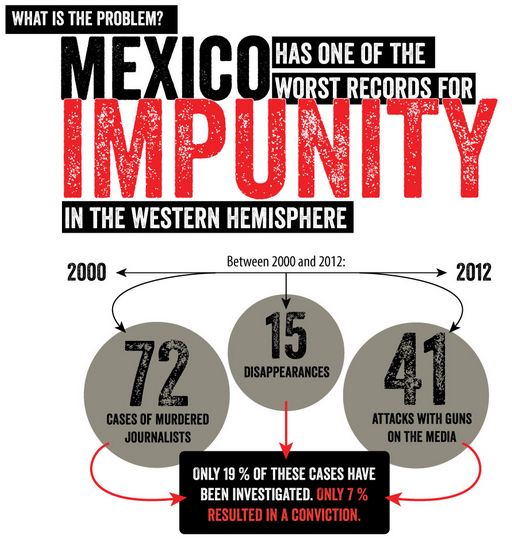
News & Analysis
Infographic: Mexican Journalists Face Worst Dangers

News & Analysis
“In Order To Fight a Network, You Need To Create a Network”
Paul Radu of the Organized Crime and Corruption Reporting Project gave an engaging talk at the recent TEDxBucharest gathering, looking at the globalization of crime and how investigation reporters and public-interest hackers can push back. Among the topics he covers: Russian money laundering, European horse meat, and Azerbaijan corruption. Says Radu: “In order to fight a network, you need to create a network.”
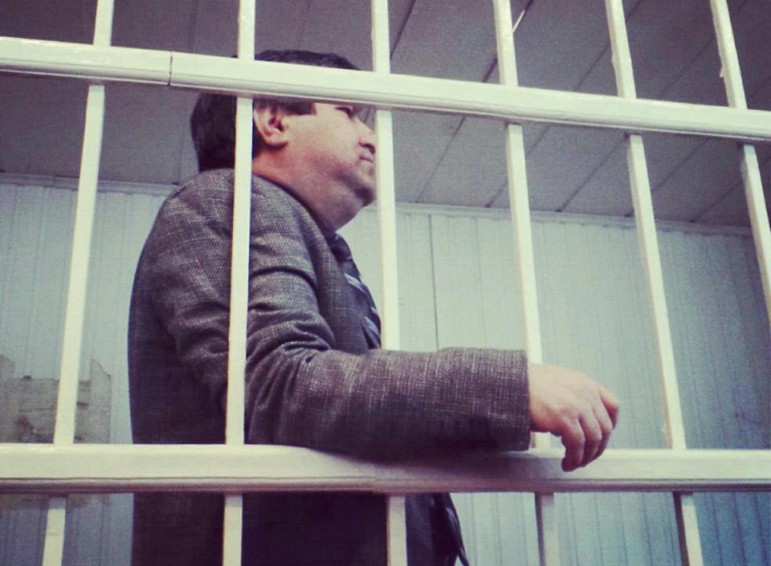
News & Analysis
Shining Light Winners Donate Prize Money to Jailed Journalist
Winners of the Global Shining Light Award have donated their US$1000 in prize money to the family of imprisoned Azerbaijani journalist Avaz Zeynalli. The Shining Light Award honors investigative journalism in a developing or transitioning country, done under threat or duress. Zeynalli was editor in chief of the daily newspaper Khural, one of a handful of independent media voices in the repressive, oil-rich nation of Azerbaijan, which lies at the borders of Russia, Iran, and Turkey

News & Analysis
Violence, Impunity Take No Holiday for Ukraine Journalists
While most of the Christian West woke up on Christmas morning to messages of peace on earth and goodwill to mankind, events in Ukraine continued down a bloody and almost heathen, medieval path. The physical assaults in the last month on journalists, activists, and demonstrators are too numerous to keep track of without a scorecard and a timeline. But the trend is so clear that even the most witless criminal investigator can see the pattern.
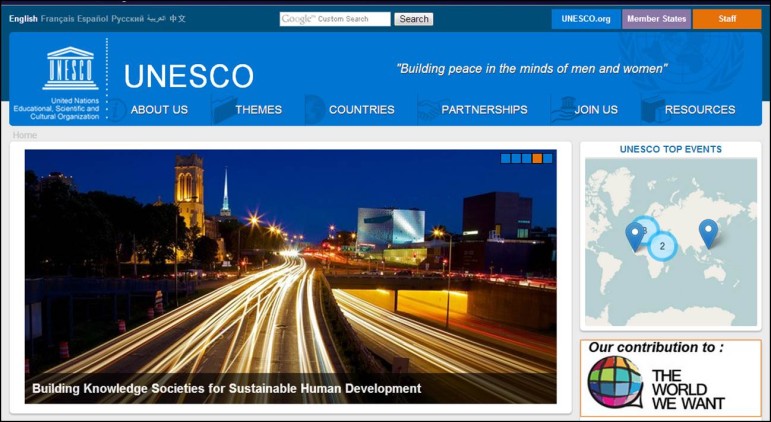
News & Analysis
UN Endorses Journalism Safety, Investigative Reporting
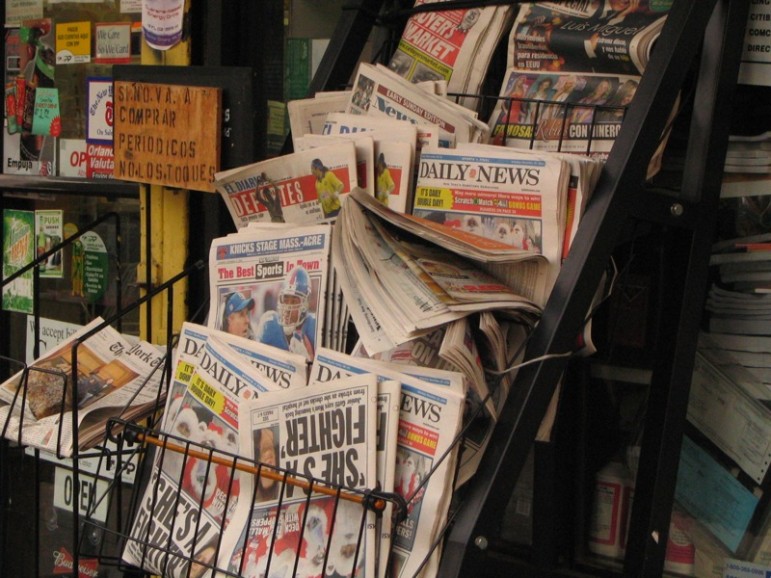
News & Analysis
Should Investigative Journalists Partner with Business?
The setting was a recent conference on “Business in Society” at INSEAD, the business school based outside of Paris, where the authors of this article were presenting their ideas on media development. Unexpectedly, an executive from a major shipping company stood up and said: “We just learned that one of our sub-contractors in a certain country is in organized crime. We want more investigative reporting, so we can avoid such issues.”
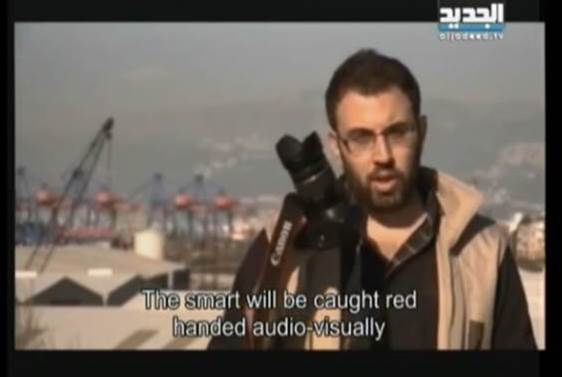
News & Analysis
ARIJ Awards Showcase Gutsy Reporting Across Middle East
Amid media crackdowns, civil war, and social unrest, 350 journalists from Tunisia to Iraq gathered in Jordan earlier this month for the annual conference of Arab Reporters for Investigative Journalism (ARIJ). Despite arduous conditions across much of the Middle East and North Africa, the conference provided strong evidence that the region’s best journalists are continuing to fight the good fight — pushing hard against censorship and bringing world-class investigative reporting to the Arab world. The event, ARIJ’s sixth annual gathering, took place in Amman from December 6-8.
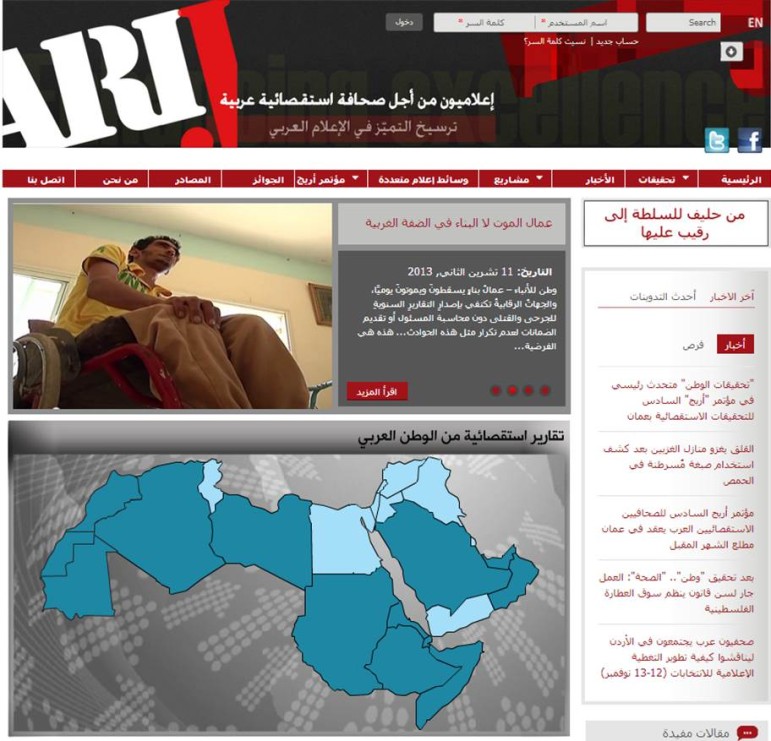
News & Analysis
Media’s Arab Spring Turns to Winter
Let me tell you how I think it will go from here. Free speech – always a lonely and sickly child in the Arab world – is already back in intensive care throughout the region.
Street protests will gradually die out. Dissenters will continue to be arrested and given harsh sentences. Sustained government propaganda will convince any waverers that political stability and economic prosperity are far more important than personal freedoms, rule of law, universal human rights, and democratic values.
Despite the wishful thinking of the crowds, the final chapter of the Arab Spring is being written: it is about over.

News & Analysis
The Rise of Digital Repression: Interactive Infographic
Online is no refuge: The PEN American Center, an association of writers and others working to defend free expression, created this interactive report to showcase the global rise of digital repression, using data from its case files over the past 12 years.
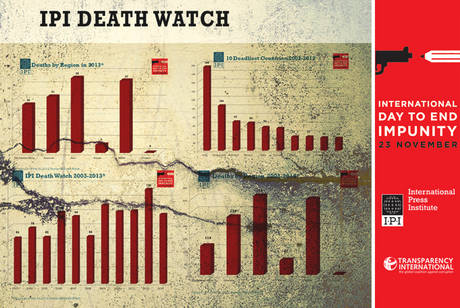
News & Analysis
Today: Int’l Day to End Impunity
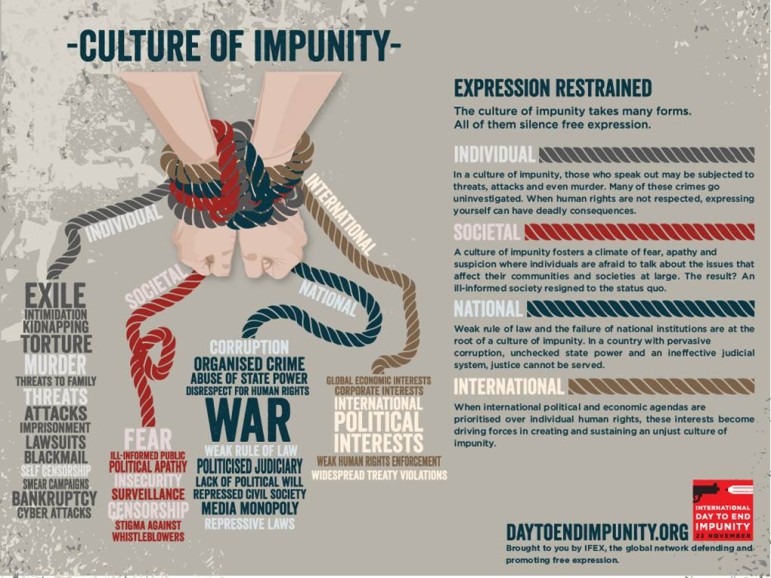
News & Analysis
International Day To End Impunity Slated for Nov. 23
Impunity is defined as “without punishment, without consequences.” It has become a shorthand way to describe the thousands of attacks on journalists and freedom of expression around the world each year. IFEX, the global network of 88 groups defending free expression, each year organizes an International Day to End Impunity. This year it takes place November 23, with events every day this month. Over the past ten years, more than 500 journalists have been killed, and in 9 of 10 cases their killers have escaped — with impunity.
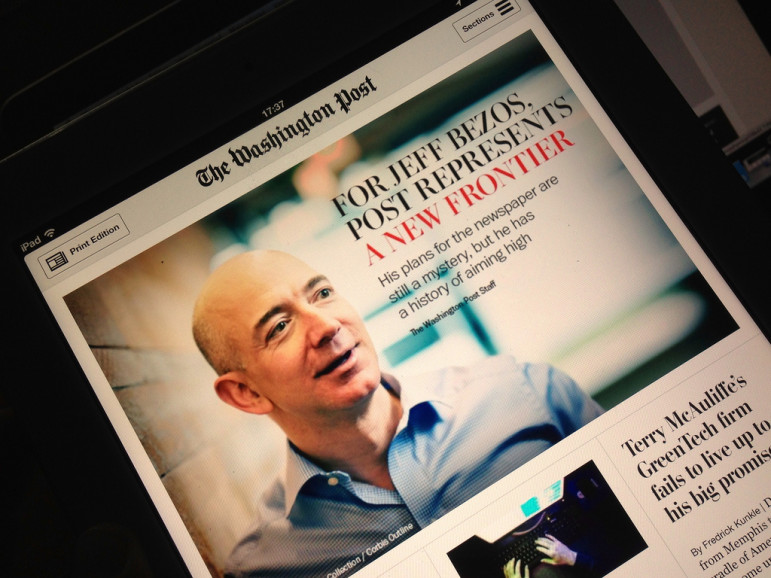
News & Analysis
Why Investigative Journalism is Good News for News Business
I may have misled people for the last few years by saying that investigative journalism is not a business but a public service. Investigative journalism does, in fact, have commercial value. While investigative journalism may not produce the web traffic of popular topics, a media organization reaps intangible but valuable benefits. Jeff Bezos, for one, seems to appreciate that value.
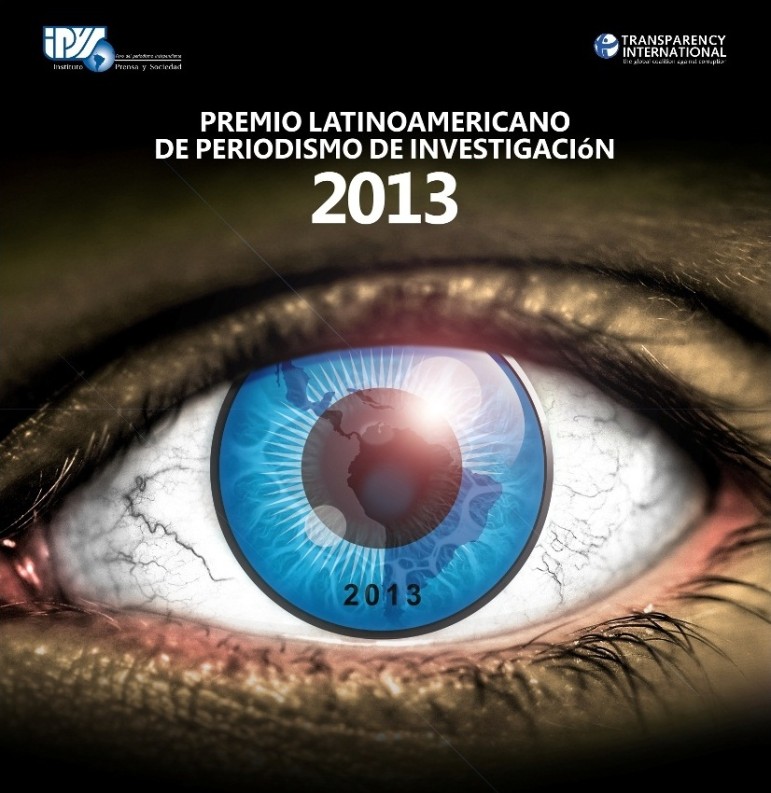
News & Analysis
IPYS Launches Travel Grants to Rio for Latin American Journos
The Instituto Prensa y Sociedad (IPYS), one of the three partner organizations behind the Global Investigative Journalism Conference, has launched a fellowship program for journalists to attend the Latin American Conference on Investigative Journalism (COLPIN) in Rio de Janeiro (October 12-15). For the first time COLPIN will be held simultaneously with the Global Conference, as well as with the national congress of ABRAJI, Brazil’s investigative journalism association.
The fellowships are part of the 4th Advanced Course for Investigative Journalism, co-organized between IPYS and Transparency International. A group of 12 journalists from across Latin America will be selected after proposing projects on organized crime in the region.

News & Analysis
Mexican Journalist Marcela Turati: “Don’t Abandon Us”
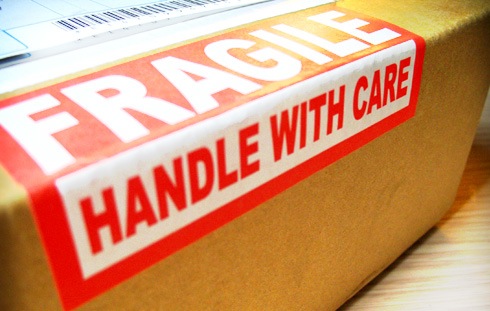
News & Analysis
Nonprofit News Model is Fragile
Nonprofits have been touted as a possible alternative to the collapsing business models of for-profit news. But a study released last week by the Pew Research Center points to the fragility of that model and also to the need for a more concerted effort to shore it up. The study identified 172 nonprofit news outlets throughout the U.S. – two-thirds of these were launched only since the 2008 financial crisis. While the recession has accelerated the closure of newspapers and the downsizing of news staffs throughout the country, it has given rise to a boom in nonprofit news.

News & Analysis
“We Are Our Worst Enemies”
As I am speaking to you today, our profession is under serious threat. Journalists are under siege because politicians have realized that we have become a bunch of cowards. We have become our own worst enemies because we want to make a living instead of making a difference in our communities, our countries, and our people. The pen is no longer mightier than a sword because the person holding it doesn’t have courage, guts, and zeal to use it as a weapon to defend the truth, justice, democracy, and our constitution.
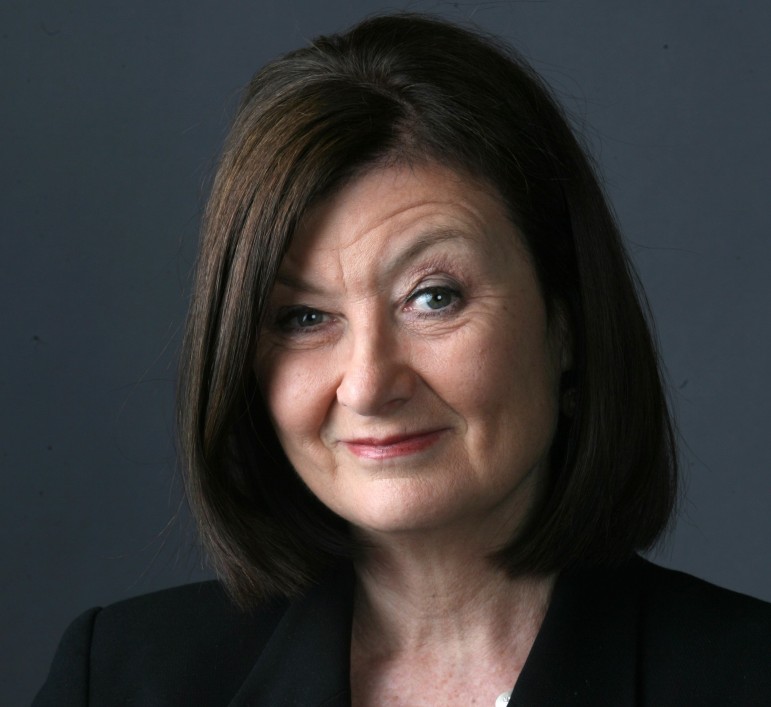
News & Analysis
Where Angels Fear To Tread
Last week, author Bob Ellis wrote: “Kate McClymont ruined my life and I do not like her. She is going after Craig Thomson lately, and she had better watch it.”
Jockey Jim Cassidy once spat on my back — or, given his size — the back of my knees.
“You fucking bitch, you’ve ruined my life,” he said.
Tom Domican, charged with murder, attempted murder and conspiracy to murder (then acquitted of the lot) once sent me this message: If I were a man he would have broken my jaw by now.
